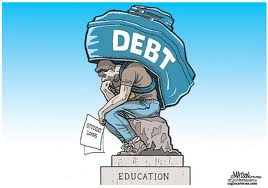 A new report from the Consumer Financial Protection Bureau (CFPB) found that many of the same types of loan servicing problems that affected consumers in the mortgage market are now affecting student loan borrowers. Just as troubled homeowners were often unable to pay their mortgages, refinance their loans, or receive timely assistance from loan servicers, many student loan borrowers are now experiencing many of the same difficulties. Although the report focuses on private student loans, some of the servicing problems identified also affect federal student loan borrows.
A new report from the Consumer Financial Protection Bureau (CFPB) found that many of the same types of loan servicing problems that affected consumers in the mortgage market are now affecting student loan borrowers. Just as troubled homeowners were often unable to pay their mortgages, refinance their loans, or receive timely assistance from loan servicers, many student loan borrowers are now experiencing many of the same difficulties. Although the report focuses on private student loans, some of the servicing problems identified also affect federal student loan borrows.
“Unfortunately, with few refinancing options, many student loan borrowers tell us they feel stuck in loans with high rates, well after they’ve graduated and landed a job”, said Rohit Chopra, CFPB’s Student Loan Ombudsman.
After analyzing approximately 3,800 student loan complaints submitted from October 1, 2012 through September 30, 2013, CFPB focused on problems with crediting payments to private student loan accounts. In this manner, CFPB found that nearly half of these complaints came from consumers seeking a loan modification. Further, 87 percent of complaints received were directed at one of eight companies. Sallie Mae, a financial services firm specializing in educational loans for more than 40 years, topped the complaint list with 49 percent.
Since July, CFPB has accepted complaints on debt collection activities, hearing from consumers whose accounts defaulted and were sent to collections because they were unable to afford their loans. Other complaints told of questions regarding how loan payments were applied, lost payments, late fees and changes in servicers without borrower notification.
In a weak economic recovery, many borrowers are financially challenged to pay their loans on time. Still others, facing financial hardships through unemployment and under-employment are finding few and no available options to refinance private student loans.
Even so, CFPB advises that there is yet hope for challenged borrowers determined to make good on their debts and get on with their lives.
Providing clear and timely instructions to your servicer can direct how your payments are applied and likely reduce the interest paid over the life of the loans.
For example, consumers with multiple credit cards and balances on each are usually advised to retire the highest-priced card debt first. A similar approach can apply to retiring private student loans.
Most borrowers take out multiple loans to pay for college, and private loan interest rates can change from year to year. Following graduation these loans are often bundled into a single account or billing group. The borrower, however, receives one bill for all loans incurred. As payments are remitted, the loans will have different balances and still have different interest rates.
By paying the minimum amount due on each loan first, additional available monies can applied to the loan with the highest interest rate. Over the life of the loans, giving priority payment to the most expensive one will likely save thousands of dollars.
Conversely, if a borrower can only afford a partial payment, speaking with the servicer before the payment due date can help avoid unnecessary late fees and penalties. Knowing the exact minimum amount and the interest owed on each loan can guide which loans can be paid and their corresponding amounts. Armed with this knowledge, it may also be possible to minimize delinquent fees or penalties.
If borrowers do not direct how their payments are to be applied, loan servicers typically act in the interest of the lenders: applying payments to earn the most money for the lender. Loan servicers should not apply payments in a way that benefits them rather than the borrower.
The Center for Responsible Lending urges the CFPB to act promptly to address all complaints alleging unfair, deceptive or abusive practices. In addition, the CFPB and the Department of Education can and should work together to establish requirements for both federal and private student loan servicers.
In the interim, troubled borrowers should seek assistance early. If communications with loan servicers do not resolve borrower concerns, the CFPB’s online complaint system can take information and assign a complaint number that can be used to check complaint status at rspnsb.li/Hdlc0O. If you prefer to speak with CFPB directly, call their toll-free line at (855) 411-2372.





Comments are closed.